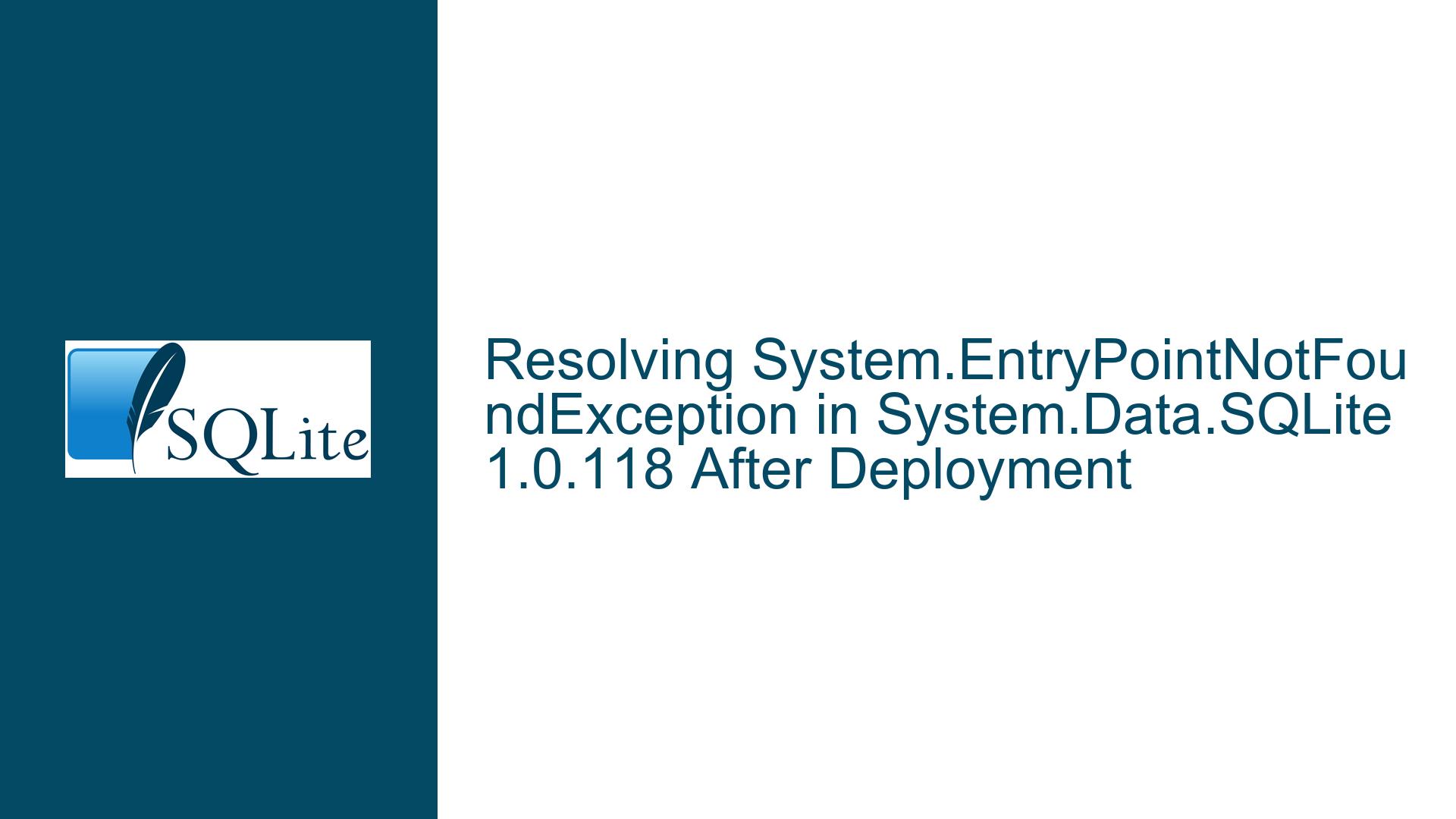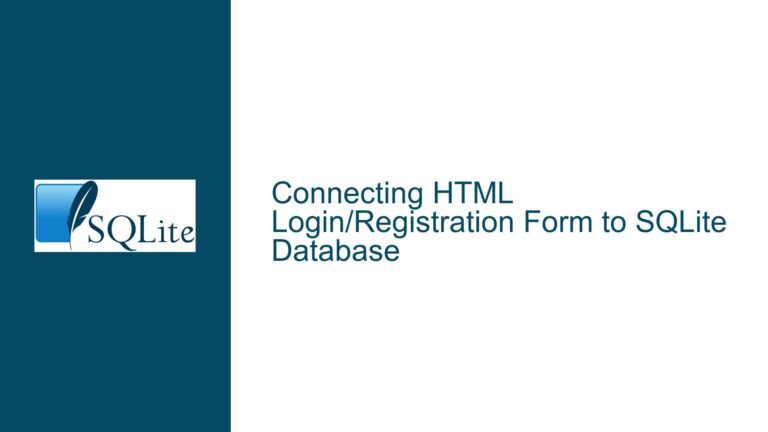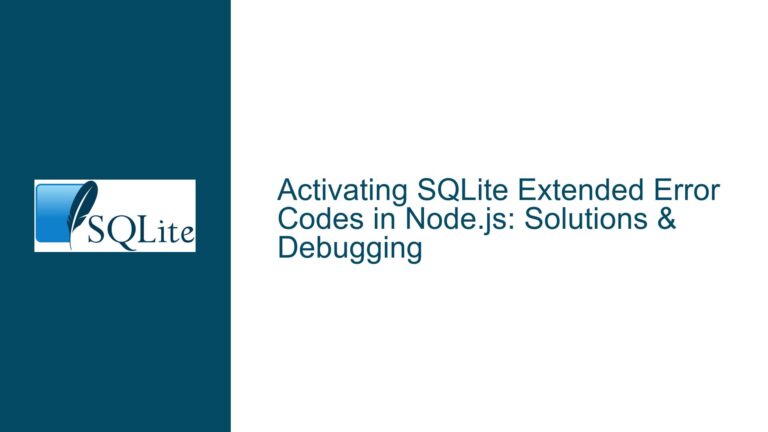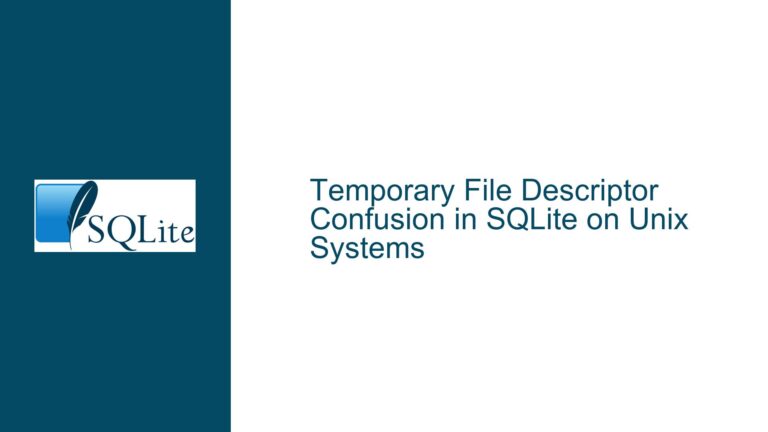Resolving System.EntryPointNotFoundException in System.Data.SQLite 1.0.118 After Deployment
Understanding the SQLite3_config_none EntryPointNotFoundException in .NET 7 WinForms Applications
The System.EntryPointNotFoundException error targeting the sqlite3_config_none method in the System.Data.SQLite.UnsafeNativeMethods class is a runtime failure that occurs when the application attempts to invoke a native SQLite function that cannot be located. This error manifests specifically after upgrading to System.Data.SQLite 1.0.118 in a .NET 7 WinForms project deployed as a single executable. The application functions correctly in development environments (e.g., Visual Studio 2022) but fails post-deployment. The error indicates a mismatch between the managed code’s expectations and the unmanaged (native) SQLite library’s availability or compatibility.
The sqlite3_config_none method is part of SQLite’s native C API, exposed to .NET via Platform Invocation Services (P/Invoke). When the SQLite3.StaticIsInitialized() method calls this native function, the runtime must locate the native SQLite library (e.g., SQLite.Interop.dll). If this library is missing, incompatible, or improperly deployed, the runtime throws an EntryPointNotFoundException. The problem is exacerbated in single-file deployments, where dependencies are bundled into a single executable and extracted to a temporary directory at runtime. Changes in dependency resolution between System.Data.SQLite versions 1.0.117 and 1.0.118 may alter how native libraries are loaded, leading to deployment failures.
Root Causes: Missing Native DLLs, Deployment Misconfiguration, and Runtime Loading Conflicts
1. Incomplete or Incorrect Deployment of Native SQLite Libraries
System.Data.SQLite relies on platform-specific native libraries (e.g., SQLite.Interop.dll for x86/x64 architectures). These libraries must be present in the application’s runtime directory or a subdirectory matching the target architecture (e.g., x86 or x64). In single-file deployments, these dependencies may not be extracted correctly, especially if the build process does not explicitly include them. Version 1.0.118 may introduce changes to the way native libraries are referenced, leading to deployment oversights.
2. Single-File Deployment Limitations in .NET 7
The .NET 7 single-file deployment model packages all dependencies into a single executable. However, native libraries require special handling. If the IncludeNativeLibrariesForSelfExtract MSBuild property is not enabled, native DLLs may be excluded from the bundle. Additionally, the runtime’s temporary extraction directory might not preserve the required folder structure (e.g., runtimes/win-x64/native), causing the native SQLite library to be misplaced.
3. Version-Specific Dependency Chain Conflicts
The upgrade to System.Data.SQLite 1.0.118 may introduce a dependency on a newer version of the native SQLite engine (e.g., SQLite 3.45.1). If the deployment package includes an older or incompatible version of SQLite.Interop.dll, the sqlite3_config_none function (which may be newly added or modified in the updated native library) will be missing, triggering the exception. This is particularly likely if the application mixes components from different System.Data.SQLite versions (e.g., manually copied DLLs).
4. Global Native Library Cache Interference
If the SQLite native library is installed in a system-wide location (e.g., Windows’ System32), the .NET runtime might load this version instead of the application-local copy. A version mismatch between the globally installed SQLite library and the one expected by System.Data.SQLite 1.0.118 can cause the entry point to resolve incorrectly.
Comprehensive Solutions: Ensuring Native Library Availability and Correct Deployment Configuration
1. Validate Native Library Deployment Structure
- Step 1: After deploying the application, inspect the output directory for the presence of
SQLite.Interop.dll. This file must reside in a subdirectory namedx86(for 32-bit) orx64(for 64-bit). Verify that these subdirectories exist and contain the correct DLL. - Step 2: For single-file deployments, use the
IncludeAllContentForSelfExtractproperty in the.csprojfile to ensure native libraries are included:<PropertyGroup> <IncludeNativeLibrariesForSelfExtract>true</IncludeNativeLibrariesForSelfExtract> <IncludeAllContentForSelfExtract>true</IncludeAllContentForSelfExtract> </PropertyGroup> - Step 3: If the runtime extracts files to a temporary directory, ensure the directory structure is preserved. Use Process Monitor (ProcMon) to trace file access patterns and confirm the runtime is searching for
SQLite.Interop.dllin the expected paths.
2. Enforce Side-by-Side Deployment
- Step 1: Avoid single-file deployment if possible. Use framework-dependent deployment with loose files, ensuring the
x86andx64directories are copied alongside the executable. - Step 2: Modify the project file to force inclusion of native libraries:
<ItemGroup> <None Include="$(OutputPath)\x64\SQLite.Interop.dll" Link="x64\SQLite.Interop.dll"> <CopyToOutputDirectory>PreserveNewest</CopyToOutputDirectory> </None> <None Include="$(OutputPath)\x86\SQLite.Interop.dll" Link="x86\SQLite.Interop.dll"> <CopyToOutputDirectory>PreserveNewest</CopyToOutputDirectory> </None> </ItemGroup>
3. Update Build and Publish Configuration
- Step 1: Specify the runtime identifier (RID) in the
.csprojfile to ensure the correct native assets are selected:<PropertyGroup> <RuntimeIdentifier>win-x64</RuntimeIdentifier> </PropertyGroup> - Step 2: Clean and rebuild the project to eliminate stale dependencies. Use
dotnet cleananddotnet publishwith the--no-self-containedflag if using framework-dependent deployment.
4. Diagnose Runtime Loading Behavior
- Step 1: Enable SQLite logging by setting
SQLiteLog.Enabled = truebefore initializing the connection. Review logs for clues about library load failures. - Step 2: Use the
fuslogvwtool (Assembly Binding Log Viewer) to log .NET assembly binding attempts. Configure it to log failures and inspect paths where the runtime searches forSQLite.Interop.dll.
5. Downgrade or Revert to Version 1.0.117
If the issue persists, downgrade to System.Data.SQLite 1.0.117 while awaiting a fix. Use NuGet Package Manager to uninstall 1.0.118 and reinstall 1.0.117:
Uninstall-Package System.Data.SQLite -Version 1.0.118
Install-Package System.Data.SQLite -Version 1.0.117
6. Verify System-Wide SQLite Installations
- Step 1: Check for globally installed SQLite libraries (e.g., in
%WINDIR%\System32). Rename or remove conflicting DLLs to force the application to use the deployed version. - Step 2: Set the
DLLsearch path explicitly usingSetDllDirectorybefore initializing SQLite:[DllImport("kernel32.dll", CharSet = CharSet.Auto, SetLastError = true)] private static extern bool SetDllDirectory(string path); // In application startup code: SetDllDirectory(Path.Combine(AppDomain.CurrentDomain.BaseDirectory, "x64"));
7. Rebuild System.Data.SQLite from Source
As a last resort, clone the System.Data.SQLite repository, compile it against the target SQLite version, and reference the custom build in your project. This ensures compatibility between managed and native components.
By methodically addressing deployment configurations, validating native library placement, and leveraging .NET’s diagnostic tools, developers can resolve the EntryPointNotFoundException and ensure seamless operation of System.Data.SQLite 1.0.118 in single-file and side-by-side deployment scenarios.






